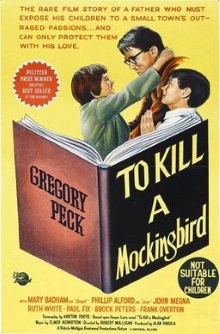
Here’s another adaptation of a very famous novel which I’ve never read. The novel entered the limelight again a few years ago due to the publication of a supposed sequel that is now more widely regarded as a first draft. This adaptation was widely acclaimed upon its release and is clearly definitive as no one has since tried remaking it.
Scout and Jem are the two children of a lawyer Atticus Finch who is widowed and lives in a town in Alabama. In the summer they befriend another boy named Dill and play together, in particular daring each to approach the house of a neighbor who has not left his house in many years and probably has mental problems. Meanwhile their father takes on the defense of a black man Tom Robinson who is accused of raping a white girl. The case inflames the white populace and Atticus becomes unpopular in town due to his determination to take the case seriously. Even the two children face difficulties in school as a result of the case and Atticus has to explain things to them. The town becomes more tense as the trial approaches and the girl’s father in particular seems to want to get back at Atticus for effectively claiming that his daughter is lying.
This is of course heavy material particularly for the era. But as my wife notes, its impact is astutely softened by telling it mainly from the perspective of a young white girl. Framing it as an adult woman looking back at her childhood experience adds a sense of nostalgia as well. It’s little wonder why the novel became as popular and highly regarded as it did and this adaptation does a great job of capturing that essence. I’ve never watched any of Robert Mulligan’s work before this and what strikes me here is great craftsmanship combined with being personally absent as a director. This film takes after the character of Atticus who calmly states the facts and keeps his nerve in the face of all provocations. The prevailing virtues are patience, tolerance and quiet determination. It’s an appeal to reason rather than the emotions while Scout with her scrappiness and outbursts is allowed as a small outlet of frustration. It’s all impeccably balanced and put together.
As enlightened and well meaning as this film is however, it’s still a product of its time. For all that Atticus sees black people as fellow human beings, it doesn’t look like he or his children ever try to really get to know them and befriend them. In fact, it presents such a tame version of the black perspective that they’re not even allowed to express any outrage over this gross miscarriage of justice. It’s nice to think that a little girl’s appeal for empathy can stop an enraged mob in its tracks and it makes for a dramatic scene but it isn’t very plausible and in a way makes light of the viciousness of the lynch mobs of the era. I also think that the extended courtroom scene might have been shocking back then but it’s not particularly good by modern standards and it somewhat damages the conceit that the story is seen through the eyes of Scout.
I would still consider this to be an exceptional film of course and it is a great watch. I also rather enjoy the thought that Scout might be more shrewd than she seems. For example, instead of being truly innocent, is she knowingly playing the part to manipulate the mob to save her father? Jem too seems to be aware of the danger posed by the girl’s father Bob Ewell and I loved how he insisted on accompanying his father to the house of Tom Robinson’s family. Those small touches add value to the children’s point of view. At the same time, the sheer horror of this atrocity, especially the real life event it was based on, almost screams out for a proportionate measure of anger and outrage, and we have to look to more modern films for that.